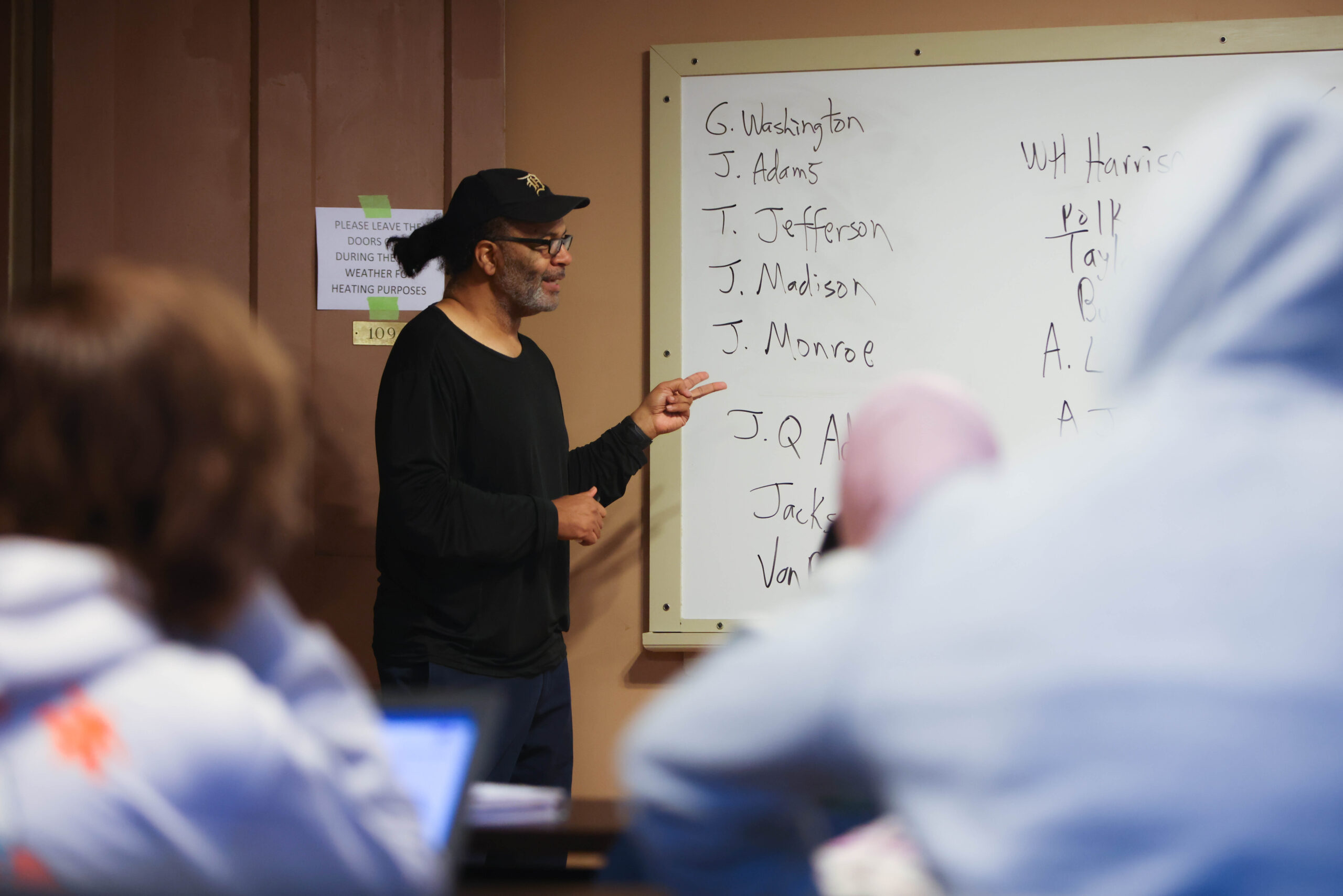Political Science
<RETURN TO ALL PROGRAMS
Political Science Overview & Goals
The study of Politics at Bethany College offers students a wide range of curricular options and vital skills that will prepare you for both graduate study and the workplace. Our department offers courses in American politics and constitutional government, international relations and foreign affairs, security policy, leadership, political thought, and parties and elections. Political Science students develop research and critical thinking skills, explore how both qualitative and quantitative methodologies can answer important questions, and refine both written and oral argument strategies that will prepare them for a wide range of careers.
Graduates in Political Science from Bethany have gone on to earn advanced degrees in many fields and hold impressive positions in government, law, public policy, diplomacy and foreign affairs, academia, and business.

Areas Of Study
Pre-Law (Pre-Professional Program)
International Studies (Major)
ALUMNISUCCESS
CAREERS IN Political Science
- Secondary
- Post-Secondary
Politics and Government
- Campaigns
- Legislative affairs
- Public policy
- Attorney
- Paralegal
Nonprofit
- Legislative affairs
- Regulatory affairs
- Journalism
- Legislative/government affairs
Requirements
POLITICAL SCIENCE MAJOR
POLITICAL SCIENCE MINOR
POLS 225, 243, plus 15 additional credits in Political Science.
PRE-LAW, PRE-PROFESSIONAL PROGRAM
No particular pattern of courses is required for admission to law schools. Students should plan to take the Law School Admission Test no later than December of the senior year. The following courses will assist students to prepare for this test: POLS 225, 322, 361-363, 401; ACCT 202-203; COMM 206, 304; PHIL 100, 123; and courses in English literature, composition, and world languages. Students interested in pre-professional preparation in law should consult the pre-law advisor.
Bethany College has also established innovative three-three programs with Duquesne University and Ohio Northern University. These programs permit a student to complete three years of undergraduate coursework at Bethany and then enter law for the completion of the J.D. degree after three more years of study (four years in the Duquesne Law School’s Evening Division). Students receive a bachelor’s degree from Bethany upon successful completion of the first year of the law program and having completed all college-wide requirements for a Bethany degree. Additional information about this program may be obtained from the Office of the Provost and Dean of Faculty.
INTERNATIONAL STUDIES MAJOR
6 credits from introductory international social science courses (chosen from POLS 111, POLS 112, and ECON 113);
6 credits from introductory international humanities courses (chosen from HIST 101, HIST 102, and RELS 220);
12 credits in world languages completed after matriculation (even if student tests into an upper-level language) and spread across 1 or 2 languages;*
15 credits in either
Track 1: Social Sciences (12 credits chosen from POLS 211, POLS 253, POLS 325, POLS 341, POLS 342, ECON 201, ECON 202, ECON 260, ECON 360, BUSI 308, BUSI 328, BUSI 345, BUSI 371, BUSI 403, PSCH 250, SOCO 210, GENS 202, COMM 345, and COMM 403; 3 credits chosen from either POLS 370 or ECON 222); OR
Track 2: Humanities (12 credits chosen from HIST 230, HIST 328, HIST 329, HIST 330, HIST 331, HIST 332, RELS 210, RELS 239, RELS 244, RELS 305, RELS 352, ENGL 200, ENGL 267, ENGL 268, ARBC 320, CHIN 320, FREN 320, FREN 321, FREN 410, GRMN 320, GRMN 321, GRMN 410, JAPN 321, SPAN 320, SPAN 321, and SPAN 410; 3 credits from HIST 377);
6 additional credits from Track 1, Track 2, INTD 202, INTD 203, INTD 204, INTD 210, INTD 211, INTD 253, INTD 306, INTD 487, INTD 488, OR any additional world language courses;
INTD 490;
INTD 495.
*International students whose native language is not English OR students who are fluent in a language other than English may substitute for 6 credits of this world language requirement with one course to enhance English language proficiency (chosen from COMM 206, ENGL 212, 220, 230, 240, THEA 120, 221, or 226) and one course to promote understanding of contemporary American culture (chosen from ENGL 250, 383, 385, HIST 202, 355, POLS 225, PSYC 250, or THEA 335). The other 6 credits of the world languages requirement cannot be substituted.
Course Descriptions
Political Science
POLS 120 Model United Nations 1 credit
This course is a study of the structure, role, and procedure of the United Nations. Emphasis is on preparation for student participation in a simulated United Nations conference. This course may be repeated for credit. (Activity course: CR/NCR only. Exception: must be taken for a letter grade by students pursuing the International Relations Interdisciplinary Studies major.)
POLS 211 Women of the World 3 credits
This course is an international study of women’s issues, focusing on women in the global economy, reproductive rights, domestic abuse, civic duties, HIV/AIDS, genital mutilation, and Sharia law. Contemporary issues pertaining to women in such countries as China, Japan, South Africa, Nigeria, Afghanistan, and Mexico are compared to promote understanding of and broaden perspectives on the lives of women outside the United States. (This course can be taken as INTD 211.)
POLS 225 American Politics 3 credits
This course is an introduction to the formal and informal structures, institutions, and processes which comprise the American political system at the national level.
POLS 243 International Politics 3 credits
This course provides an introduction to international relations. Emphasis is on the study of conflict and cooperation in the international system and on the study of power, diplomacy, alliances, international law and organization, and other forms of interaction.
POLS 244 Comparative Politics 3 credits
This course is a study of the basic theories and issues in the subfield of comparative politics. Topics covered will include comparative methodology, economic development, regime type, political institutions, and comparative social issues such as revolution, ethnicity, and nationalism. Students who successfully complete this course will understand basic comparative political methodology, comparisons of political institutions and governmental systems, and how public policies affect populations.
POLS 253 Nature and International Society 3 credits
This course is an examination of the political, economic, ethical/philosophical, and international security dimensions of the relationship between the environment and society. Special focus is on the role of political institutions and the market in resolving the ecological challenges of the 21st century.
POLS 320 Legislative Process 3 credits
This course examines the roles of the United States Congress and other national legislatures as makers of law and policy. Emphasis is on formal and informal internal structural organizations. Prerequisite: POLS 225.
POLS 321 Executive Leadership 3 credits
This course is a study of the roles and functions of the President of the United States in relation to the other branches of government, the states, and the international system. Prerequisite: POLS 225.
POLS 322 Judicial Behavior 3 credits
This course is a study of the United States courts as institution and process, emphasizing the Federal courts. The course examines the role of courts as defenders of the rights of citizens and as makers of law and policy. Prerequisite: POLS 225.
POLS 325 Political Economy 3 credits
This course is a study of the theoretical and policy interrelationship of politics and economics, state and market, in the international system. Emphasis is on the role of government and international organizations in the authoritative allocation of public and private goods. Socio-economic decision-making mechanisms (market, hierarchy, bargaining, etc.) are identified and analyzed on a global scale. Neo-classical, Keynesian, Marxist, and non-traditional approaches to political economy are examined. Prerequisite: POLS 243.
POLS 337 Campaigns and Elections 3 credits
This course studies the democratic dynamic in the United States in its electoral form. Particular emphasis is on voting behavior, political parties, candidate decision-making, and political campaign strategy. Political culture and processes of participatory democracy are also emphasized.
POLS 341 United States Foreign Policy 3 credits
This course is an examination of the assumptions and mechanics underlying the making of U.S. foreign policy since World War II. The course provides a framework for analyzing foreign policy decision-making and the various approaches to the formulation and conduct of post-Cold War foreign policy.
POLS 342 International Organizations 3 credits
This course broadly focuses on the idea of international cooperation while examining more specifically the roles of international organizations (IOs), both inter-governmental and non-governmental, in international politics. Emphasis is on topics such as the relationships between major international relations theories and IOs, the evolution of international law, the structure and function of IOs, and the issue areas addressed by IOs.
POLS 361 Ancient and Medieval Political Thought 3 credits
This course provides an introduction to ancient and medieval political thought. Fundamental questions examined include: What is the relationship between ethics and politics?; What is a good regime?; What is a good citizen?; What is the relationship between law and ethics?; What is the relationship between theology and political thought? Students are guided in a close reading of important political works, including Plato’s Apology and Republic, Aristotle’s Nicomachean Ethics and Politics, and Augustine’s City of God. (This course can be taken as PHIL 361.)
POLS 362 Modern Political Thought 3 credits
As an introduction to modern and post-modern political through, students examine the writings of important political thinkers of the past 500 years. Emphasis is on the development of political theories regarding issues such as democracy, citizenship, justice, equality, race, gender, sexuality, and the environment. (This course can be taken as PHIL 362.)
POLS 363 American Political Thought 3 credits
This course examines the roots, foundation, and development of American political thought. Special attention is given to the political thought of the Founding Fathers and to contemporary schools of thought such as feminism and communitarianism.
POLS 370 Research Methods in Political Science 4 credits
This course is a study of the scope and methods of research through an examination of approaches, models, and theories. Qualitative and quantitative methods are studied and applied. The course includes the design and execution of a team research project. An emphasis is on preparation for the Senior Project. Prerequisite: Permission of the instructor.
POLS 371-379 Selected Topics in Political Science 2-4 credits
This is a series of upper level courses in Political Science. The content of specific courses varies. Prerequisite: Permission of the instructor.
POLS 401 Constitutional Law 3 credits
Case studies and moot cases examine the historical development of important constitutional issues before the United Stated Supreme Court. Students become familiar with the basic structure and functions of the federal court system. (This course may be taken for credit as HIST 401.)
POLS 470 Internship in Political Science 2-8 credits
This internship is a faculty supervised off-campus experience with an academic dimension. Each internship combines off-campus work with a substantial research project. The off-campus experience and the proposed research project must be approved by the chair of the department prior to the beginning of the internship. Off-campus work is supervised jointly by a faculty supervisor and a designated off-campus mentor. The student is evaluated by the faculty supervisor who may take into consideration the evaluation of the mentor.
POLS 477 Senior Seminar in Political Science 3 credits
This course is a study of Political Science as a discipline, including its major subfields: Theory and Method; Political Processes and Individual Behavior; Political Institutions of the State; Nations and their Relationships.
POLS 487-488 Independent Study 2-4 credits
POLS 490 Senior Project 2-4 credits
The student plans and pursues an independent project in Political Science.
POLS 495 Comprehensive Exams
This course is an administrative placeholder used to record a student’s score on Comprehensive Exams (CR/NCR).




Info
Visit
Apply
Deposit